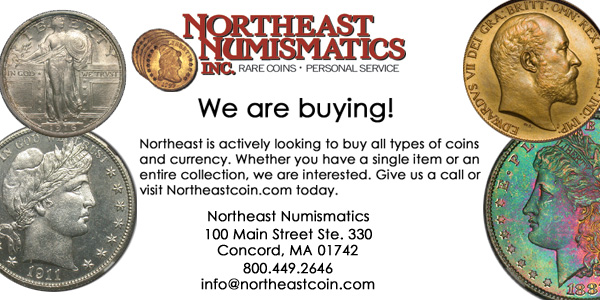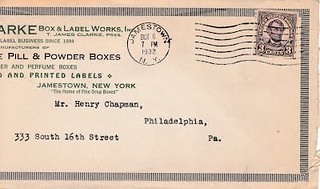
PREV ARTICLE
NEXT ARTICLE
FULL ISSUE
PREV FULL ISSUE
THOMAS JAMES CLARKE (1875-1952)John Lupia submitted the following information from the online draft of his book of numismatic biographies for this week's installment of his series.
Thanks! As always, this is an excerpt with the full article and bibliography available online. This week's subject is New York collector T. James Clarke. -Editor
His birth information is incorrect published in The Numismatist since the above is taken directly from the original sources in Ontario. In 1894, twenty-one year old Clarke moved to Batavia, New York, where he worked temporarily as a wheelwright for his uncle John M. Sweet in order to establish himself in America. The following year in 1895, he began to work as a salesman for E. N. Rowell Paper Box Company until 1900. In 1900, he founded Clarke-Dorman Drug Box Company. He sold his share of ownership in 1902 to William Koehl. Clarke remained with the William Koehl company until 1916. On June 26, 1912, he married Hazel Clarabel Johnson (1883-1974), daughter of Olaf Johnson, a tailor, at Chautauqua, New York. They had no issue.
He also served as the Director of the National Chautauqua County Bank, and also for a few other corporations. Clarke was also quite inventive and held patents on two cabinets marketed to druggists. T. J. Clarke was an old time traditional collector, i.e., he collected all the wide variety of items and objects typically found in curiosity cabinets. These cabinets were like the Italian use of the word, a whole room. There he kept and arranged autographs, glassware, Indian relics, postage stamps, coins, paper money, and weapons. Clarke is remembered today among the EAC'ers as a buyer of the French collection of large cents. However, colonial notes, old bank notes, and obsolete paper money are also areas from which collectors today trace provenance on many prized pieces. He was ANA Life Member No. 37. He served as 20th President of the ANA from August 29, 1935, to August 26, 1937. He sold his entire collection of silver coins to B. Max Mehl in 1939. In 1944, he exhibited more than 1,000 Lincoln medals. He died at home in Jamestown, New York, on July 20, 1952. His paper money collection was sold posthumously at auction by Abe Kosoff November 8, 1955. Clarke's massive collection of coins were sold in four separate auctions prior to his death, and seven posthumously. Clarke's boxes were popular with coin collectors for storing coins. The William F. Dunham collection of U.S. Encased Postage stamps is mentioned elsewhere in this issue; each piece in the giant collection had its own T. James Clarke-manufactured box. I acquired the labeled boxes from John J. Ford via Robert Kincaid when Bob and I were working with Fred Reed on EPS research for Reed's book in the 1980s. -Editor To read the complete article, see:
The entire inventory of the Lupia Numismatic Library is for sale. Individual items will be available before the remaining archives are broken up into parcels sold at philatelic auctions in the U. S. and Hong Kong. Check NumismaticMall.com frequently as dozens of new items with estimates will be posted daily until everything is sold. All inquiries will be given prompt and courteous attention. Write to: john@numismaticmall.com . 
Wayne Homren, Editor The Numismatic Bibliomania Society is a non-profit organization promoting numismatic literature. See our web site at coinbooks.org. To submit items for publication in The E-Sylum, write to the Editor at this address: whomren@gmail.com To subscribe go to: https://my.binhost.com/lists/listinfo/esylum All Rights Reserved. NBS Home Page Contact the NBS webmaster 
|

